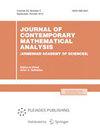与它们的差分算子共享多项式的单项式函数的衍生物
IF 0.4
4区 数学
Q4 MATHEMATICS
Journal of Contemporary Mathematical Analysis-Armenian Academy of Sciences
Pub Date : 2023-12-28
DOI:10.3103/s1068362323060079
引用次数: 0
摘要
Abstract 在本文中,我们研究了有限阶微变函数 \(f(z)\) 关于其差分算子 \(\Delta_{c}f(z)\) 和导数 \(f^{\prime}(z)\) 的唯一性,并证明如果 \(\Delta_{c}f(z)\) 和 \(f^{\prime}(z)\) 共享 \(a(z)\)、\CM, 其中 (a(z))和 (b(z))是两个不同的多项式,那么它们假设以下情况之一:\((1)\)\(f^{\prime}(z)\equiv\Delta_{c}f(z)\);\((2)/)(f(z))减为多项式,并且(f^{\prime}(z)-A\Delta_{c}f(z)\equiv(1-A)(c_{n}z^{n}+c_{n-1}z^{n-1}+\cdots+c_{1}z+c_{0})、其中 \(A(\neq 1)\)是一个非零常数,而 \(c_{n},c_{n-1},\cdots,c_{1},c_{0}\) 都是常数。这概括了 Qi 等人和 Deng 等人的相应结果。本文章由计算机程序翻译,如有差异,请以英文原文为准。
Derivatives of Meromorphic Functions Sharing Polynomials with Their Difference Operators
Abstract
In this paper, we investigate the uniqueness of meromorphic functions of finite order \(f(z)\) concerning their difference operators \(\Delta_{c}f(z)\) and derivatives \(f^{\prime}(z)\) and prove that if \(\Delta_{c}f(z)\) and \(f^{\prime}(z)\) share \(a(z)\), \(b(z)\), \(\infty\) CM, where \(a(z)\) and \(b(z)\) are two distinct polynomials, then they assume one of following cases: \((1)\) \(f^{\prime}(z)\equiv\Delta_{c}f(z)\); \((2)\) \(f(z)\) reduces to a polynomial and \(f^{\prime}(z)-A\Delta_{c}f(z)\equiv(1-A)(c_{n}z^{n}+c_{n-1}z^{n-1}+\cdots+c_{1}z+c_{0})\), where \(A(\neq 1)\) is a nonzero constant and \(c_{n},c_{n-1},\cdots,c_{1},c_{0}\) are all constants. This generalizes the corresponding results due to Qi et al. and Deng et al.
求助全文
通过发布文献求助,成功后即可免费获取论文全文。
去求助
来源期刊
CiteScore
0.70
自引率
0.00%
发文量
32
审稿时长
>12 weeks
期刊介绍:
Journal of Contemporary Mathematical Analysis (Armenian Academy of Sciences) is an outlet for research stemming from the widely acclaimed Armenian school of theory of functions, this journal today continues the traditions of that school in the area of general analysis. A very prolific group of mathematicians in Yerevan contribute to this leading mathematics journal in the following fields: real and complex analysis; approximations; boundary value problems; integral and stochastic geometry; differential equations; probability; integral equations; algebra.

 求助内容:
求助内容: 应助结果提醒方式:
应助结果提醒方式:


